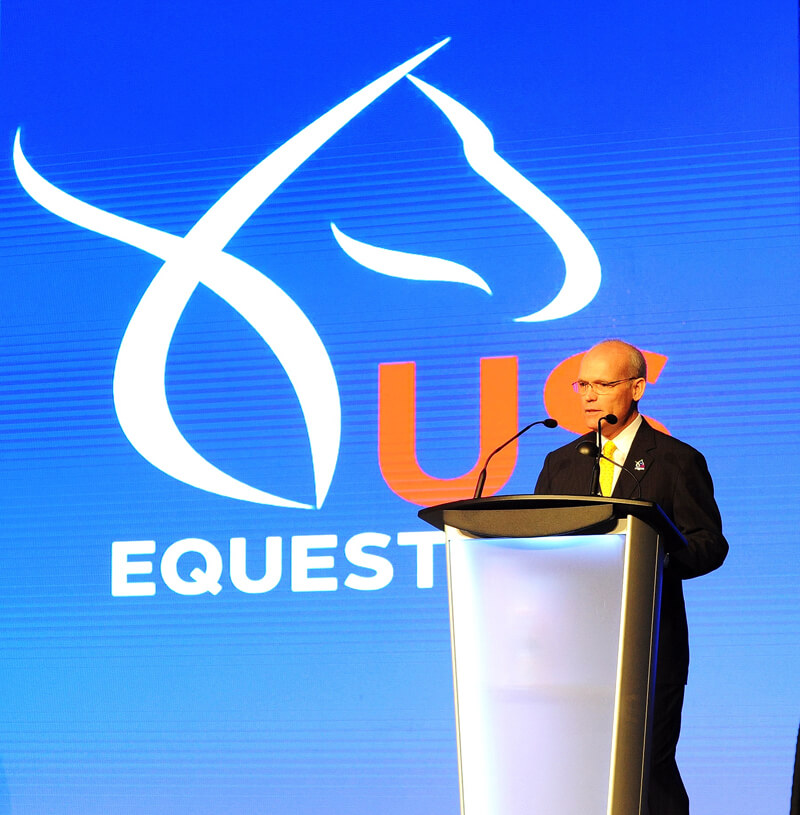When does a challenge become an opportunity? For the U.S. Equestrian Federation, that happened in the wake of an embarrassing laboratory mistake involving a high-profile drug test.
The error and subsequent cover-up led to the federation reversing hefty suspensions and fines levied against hunter trainer Larry Glefke and rider Kelley Farmer. They were accused in connection with a horse that had tested positive for Gaba, a prohibited substance. The situation was particularly difficult because at the USEF’s 2017 annual meeting, the big news was the punishment levied against the two.
During the 2018 annual meeting, where the blunder was revealed, USEF officials knew they needed to reassure their constituents about the drug testing program’s integrity.
As USEF President Murray Kessler put it, “We have egg on our face,” while conceding “there obviously wasn’t enough oversight” and vowing “there will be no stone left unturned.”
Plans to audit the USEF’s testing laboratory were announced immediately, along with appointment of an ad-hoc committee headed by board member Tom O’Mara. Its mission was to examine all aspects of the testing program – a cornerstone of the federation’s responsibilities and its commitment to creating “a level playing field.”
Although those involved in the snafu were gone in short order, the USEF had to make sure nothing similar would happen that could rock members’ confidence in the future. An alternative discussed early on involved outsourcing the lab work, rather than having the USEF lab continue to handle it. The federation finally decided to seek collaboration with the University of Kentucky, also based in Lexington.
“Although we have signed a letter of intent with the University of Kentucky, there are still some details to be worked out,” Bill Moroney, the USEF’s CEO, said last week.
“Our goal is to finalize an agreement early in the coming year for an arrangement that has great potential.”
Both parties are “100 per cent committed to working to make this opportunity a reality. I believe we can get to the right place,” he said.
As Bill pointed out, even under the best circumstances, “In reality, mistakes are going to happen. The important part about rebuilding and maintaining confidence is making sure you have the processes in place and the people in place that follow the process and you have the right amount of oversight so those things don’t occur again.”
But there’s more to it than that. The mishap sparked the move toward a broader initiative that could pay off in several important ways for the equestrian community.
“Would we have had this discussion if we hadn’t had a mistake in the lab last year? I don’t know. From challenge and adversity comes opportunity,” Bill observed.
“At this moment, these opportunities are aligning for us to potentially move in a direction that could be way more beneficial for horses and people across the board in equestrian. Sometimes, it’s just the right people in the right place at the right time.”
In that regard, one key element involves the arrival at UK in January of the highly respected Dr. Scott Stanley, who was a professor of equine chemistry at the Kenneth L. Maddy Equine Analytical Chemistry Laboratory at the University of California at Davis. His primary research interest includes analytical methods for detecting drugs, metabolites and natural products in biological samples.
Bill anticipates that the USEF/UK concept could “provide our community with research opportunities not currently available to us.”
For instance, while USEF isn’t able to do such research, UK does have that ability, and one scenario could enable USEF to “get involved in helping them understand the type of research that needs to be done in the sport horse industry,” according to Bill.
A research component could open the door for more than just a drug testing arrangement. “It’s about making our horses’ lives better and protecting the welfare and safety of our horses, which in turn affects the welfare and safety of the riders,” Bill said.
He pointed out UK “could do research on new things coming onto the marketplace and how they might affect a horse, not only through medication, but through other therapeutic modalities that help a horse out.”
And that’s how a stumble has the potential to be a big step forward.
~Nancy Jaffer

